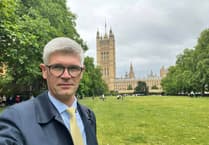Skyscrapers may seem like an easy option to meet the requirements placed on us by the government – the plans submitted for Woking's newest 25-storey skyscraper on Goldsworth Road/Poole Road join a long list of contenders to be constructed in the town's heart.
Two buildings would be demolished to make way for nearly 600 apartments, 350 allocated to students at Woking's Italia Conti Performing Arts Academy and the remaining 230 expected to be operated as residential apartments.
How Woking Borough Council's attitude towards skyscrapers has changed. In 2019, Cllr Anne-Marie Barker fumed, saying: "Concentrating development in the town centre makes sense and protects our green belt, but that does not mean we need a town centre full of skyscrapers.
"When the skyscrapers of Victoria Square were proposed, we were told they were stand-out, exceptional buildings for the town. Now, they are being used as a precedent to build a Woking full of skyscrapers. The council's chief executive regularly denies his ambition to make Woking the Singapore of Surrey. On current evidence, that is exactly where we are heading."
In 2022, Will Forster, now Woking’s MP, said: "The Lib Dems and I are appalled that even taller towers will soon be built in Woking. The Goldsworth Road area is a brownfield site ideal for development, but Woking does not need yet more high-rise buildings with lots of one-bedroom flats, which are in less demand after the pandemic.
"The Tories' planning policy is failing Woking. If the Lib Dems win the election in May, they will create a masterplan for the town centre to control development and ensure people can have their say on the future of Woking."
Regrettably, the promise of the masterplan seems to be forgotten. It appears that Woking is now heading towards becoming the "Singapore of Surrey”.
However, to achieve a successful Singapore-style status, Woking needs to learn the crucial lessons from Singapore that started 70 years ago with the meticulous planning of a squatter settlement, Toa Payoh, a wasteland described as an "extensive and notorious district" acquired in 1950 by the Singapore Improvement Trust.
In short, the story of Singapore's prolific rise, a mixture of the old and the new, hasn't happened overnight with hasty costly decisions to construct more and more mega-storey concrete blocks of flats.
At the same time, attention was paid to investing in building the infrastructure, not only of public services such as schools, GP services, transport and leisure facilities, but more importantly affordable homes and business premises with ample parking.
But in Woking, multi-storey buildings get planning permissions granted without adequate underground parking facilities, worsening parking in neighbouring villages and the town centre.
A compulsory requirement for granting any new multi-storey building planning permission should provide underground parking for residents.
A realistic approach for Woking would be to put a temporary moratorium on planning permissions.
It doesn't mean a ban on building high-rises or even a few-storey-high blocks in the town centre or surrounding wards; but long enough to allow the building of much-needed infrastructure to catch up.



.jpeg?width=209&height=140&crop=209:145,smart&quality=75)

Comments
This article has no comments yet. Be the first to leave a comment.